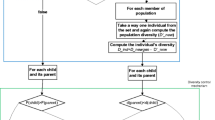Abstract
In this paper, an efficient diversity preserving selection (DPS) technique is presented for multiobjective evolutionary algorithms (MEAs). The main goal is to preserve diversity of nondominated solutions in problems with scaled objectives. This is achieved with the help of a mechanism that preserves certain inferior individuals over successive generations with a view to provide long term advantages. The mechanism selects a group (of individuals) that is statistically furthest from the worst group, instead of just concentrating on the best individuals, as in truncation selection. In a way, DPS judiciously combines the diversity preserving mechanism with conventional truncation selection. Experiments demonstrate that DPS significantly improves diversity of nondominated solutions in badly-scaling problems, while at the same time it exhibits acceptable proximity performance. Whilst DPS has certain advantages when it comes to scaling problems, it empirically shows no disadvantages for the problems with non-scaled objectives.
Similar content being viewed by others
References
Ahn CW (2006) Advances in evolutionary algorithms: theory, design and practice. Springer, New York
Ahn CW, Goldberg DE, Ramakrishna RS (2004) Real-coded bayesian optimization algorithm: Bringing the strength of BOA into the continuous world. In: Lecture notes in computer science, vol 3102. Springer, Berlin, pp 840–851
Ahn CW, Ramakrishna RS (2007) Multiobjective real-coded Bayesian optimization algorithm revisited: Diversity preservation. In: Proc. of GECCO’07. ACM, New York, pp 593–600
Bosman PAN, Thierens D (2002) Multiobjective optimization with diversity preserving mixture-based iterated density estimation evolutionary algorithm. Int J Approx Reasoning 31(3):259–289
Bosman PAN, Thierens D (2003) The balance between proximity and diversity in multiobjective evolutionary algorithm. IEEE Trans Evol Comput 7(2):174–188
Chen JH (2004) Theory and applications of efficient multiobjective evolutionary algorithms. PhD dissertation, Feng Chia Univ., Taiwan, R.O.C
Chen J, Mahfouf M (2006) A population adaptive based immune algorithm for solving multi-objective optimization problems. In: ICARIS’06. Lecture notes in computer science, vol 4163. Springer, Berlin, pp 280–293
Coelho GP, Von Zuben FJ (2006) Omni-aiNet: an immune-inspired approach for omni optimization. In: ICARIS’06. Lecture notes in computer science, vol 4163. Springer, Berlin, pp 294–308
Coello CAC, Pulido GT, Lechuga MS (2004) Handling multiple objectives with particle swarm optimization. IEEE Trans Evol Comput 8(3):256–279
Deb K, Pratap A, Agarwal S, Meyarivan T (2002) A fast and elitist multiobjective genetic algorithm: NSGA-II. IEEE Trans Evol Comput 6(2):182–197
di Pierro F, Khu ST, Savic DA (2007) An investigation on preference order ranking scheme for multiobjective evolutionary optimization. IEEE Trans Evol Comput 11(1):17–45
Dumitrescu D, Lazzerini B, Jain LC, Dumitrescu A (2000) Evolutionary computation. CRC, Boca Raton
Fieldsend JE, Singh S (2002) A multi-objective algorithm based upon particle swarm optimization, an efficient data structure and turbulence. In: Proc of 2002 UK workshop on computational intelligence, pp 37–44
Fonseca CM, Fleming PJ (1998) Multiobjective optimization and multiple constraint handling with evolutionary algorithms—part I: a unified formulation. IEEE Tran Syst Man Cybern B 28(1): 26–37
Khan N (2003) Bayesian optimization algorithms for multiobjective and hierarchically difficult problems. MS thesis, Univ. Illinois at Urbana-Champaign
Laumanns M, Ocenasek J (2002) Bayesian optimization algorithms for multi-objective optimization. In: PPSN VII. Lecture notes in computer science, vol 2439. Springer, Berlin, pp 298–307
Li X et al. (2003) A nondominated sorting particle swarm optimizer for multiobjective optimization. In: GECCO’03. Lecture notes in computer science, vol 2723. Springer, Berlin, pp 37–48
Lu H, Yen G (2003) Rank-density-based multiobjective genetic algorithm and benchmark test function study. IEEE Trans Evol Comput 7(4):325–343
Mühlenbein H, Schlierkamp-Voosen D (1993) The science of breeding and its application to the breeder genetic algorithm (BGA). Evol Comput 1(4):335–360
Ocenasek J, Schwarz J (2002) Estimation of distribution algorithm for mixed continuous-discrete optimization problems. In Proc of the 2nd int symp on computational intelligence, pp 227–232
Pedersen G, Goldberg DE (2004) Dynamic uniform scaling for multiobjective genetic algorithms. In: GECCO’04. Lecture notes in computer science, vol 3103. Springer, Berlin, pp 11–23
Pelikan M, Sastry K, Goldberg DE (2005) Multiobjective hBOA, clustering, and scalability. In: Proc. of GECCO’05. ACM, New York, pp 663–670
Srinivas N, Deb K (1995) Multiobjective optimization using nondominated sorting in genetic algorithms. Evol Comput 2(3):221–248
Wolpert DH, Macready WG (1997) No free lunch theorems for optimization. IEEE Trans Evol Comput 1(1):67–82
Zitzler E, Thiele L (1999) Multiobjective evolutionary algorithms: A comparative case study and the strength Pareto approach. IEEE Trans Evol Comput 3(4):257–271
Zitzler E, Laumanns M, Thiele L (2002) SPEA2: Improving the strength Pareto evolutionary algorithm. In: Proc on evolutionary methods for design, optimization, and control, pp 95–100
Zitzler E, Künzli S (2004) Indicator-based selection in multiobjective search. In: PPSN VIII. Lecture notes in computer science, vol 3242. Springer, Berlin, pp 832–842
Author information
Authors and Affiliations
Corresponding author
Rights and permissions
About this article
Cite this article
Ahn, C.W., Ramakrishna, R.S. A diversity preserving selection in multiobjective evolutionary algorithms. Appl Intell 32, 231–248 (2010). https://doi.org/10.1007/s10489-008-0140-0
Received:
Accepted:
Published:
Issue Date:
DOI: https://doi.org/10.1007/s10489-008-0140-0




